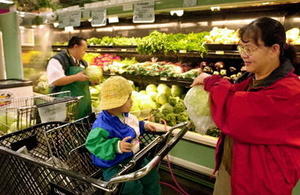The food we eatCountries closely monitor Japanese food for radiation
On Saturday, Japan announced that radiation was detected in spinach and milk produced near the Fukushima nuclear plant; the levels were low enough to not pose a long-term threat to human health, but they were above the national safety level, so the Japanese government has stopped sales of food products from near the damaged plant; countries importing food products from Japan are on alert

Japan stops sale of food from near nuclear plant // Source: oregonlive.com
On Saturday, Japan announced that radiation was detected in spinach and milk produced near the Fukushima nuclear plant. The levels were low enough to not pose a long-term threat to human health, but they were above the national safety level, so the Japanese government has stopped sales of food products from near the damaged plant.
Food Safety News reports that it was the first report of radiation contamination in food since the 11 March tsunami damaged the power plant.
As the plumes of nuclear smoke first began to rise over Japan’s destabilized Fukushima nuclear plant, so did concerns that food coming from that country might contain radioactive material.
Several countries are taking steps to ensure the safety of their food supplies. In Asia, South Korea, Indonesia, Thailand, Malaysia, India, Singapore, and the Philippines have all begun to monitor Japanese food imports.
Hong Kong’s Centre for Food Safety (CFS) has ramped up its surveillance of food coming from Japan as well.
As of Saturday, no levels of radioactivity have been detected, but fresh food from Japan is being refused in some areas. Some sushi restaurants in Asia have reportedly taken Japanese seafood off the menu, and Italy has banned Japanese imports altogether.
The United States imports only limited amounts of food from Japan and in a statement Thursday, the U.S. Food and Drug Administration (FDA) said it “has a very robust screening process in place at the ports to monitor incoming products.”
If radiation were to contaminate Japanese food, fresh produce would most likely be affected first. “The surface of foods like fruits and vegetables or animal feed can become radioactive by deposit of radioactive materials falling on it from the air or through rain water,” says a release from the World Health Organization (WHO) and the UN’ Food and Agricultural Organization.
Radioactivity can then build up inside food sources, such as animals or fish, as radionuclides settle into soil or water, according to WHO.
The presence of these harmful particles in soil was what led to the contamination of cow milk following the nuclear explosion at Chernobyl in 1986, after cows ate grass grown in radioactive soil. Some fear that the Fukushima leak could lead to a similar threat, and at the least shake public confidence in some popular Japanese products, such as wagyu beef.
